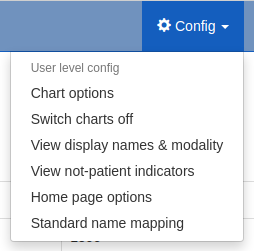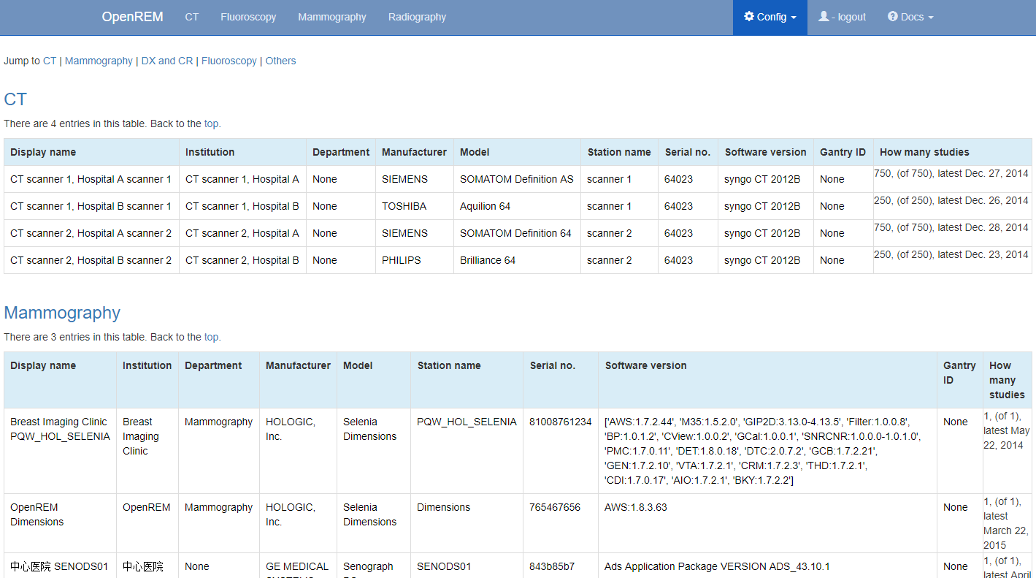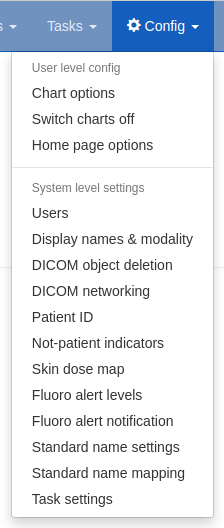Display names and user-defined modalities
The display name field
Previous versions of OpenREM used each X-ray system’s DICOM station name as
the identifier for each X-ray system. The front page showed a summary of the
number of studies for each unique station name stored in the system.
This led to a problem if multiple X-ray systems used the same station name: the
OpenREM home page would only show one station name entry for these systems,
with the number of studies corresponding to the total from all the rooms. The
name shown alongside the total was that of the system that had most recently
sent data to the system.
This issue has been resolved by introducing a new field called
display name. This is unique to each piece of X-ray equipment, based on the
combination of the following eight fields:
manufacturer
institution name
station name
department name
model name
device serial number
software version
gantry id
The default text for display name is set to a combination of
institution name and station name. The default display name text can be changed by a user in the admingroup
— see Setting display name automatically for known devices
User defined modality field
OpenREM determines the modality type of a system based on the information in the DICOM radiation dose structured report. However sometimes this mechanism fails because vendors use templates meant for RF also for DX systems. Therefore it is possible from version 0.8.0 to set a modality type for each system manually. A manually set modality type overrides the automatically determined value.
Viewing X-ray system display names and user defined modality

The Config menu (user)
If you log in as a normal user then the Config menu becomes available
at the right-hand end of the navigation bar at the top of the screen.
The third option, View display names & modality, takes you to a page where
you can view the list of X-ray systems with data in OpenREM together with their
current display name and user defined modality. If the user defined modality
is not set, the value contains None. The X-ray systems are grouped
into modalities and displayed in five tables: CT; mammography; DX and CR;
fluoroscopy; and other.

Example list of display names
Setting display name automatically for known devices
If you are a member of the admingroup you can set an option to
automatically set the display name of already known devices even if one of
the above mentioned fields changed.
A device can send its Device Observer UID (especially in rdsr-objects). This
is a unique ID for the device. If this UID is received by OpenREM it can set
the display name and modality type the same as an already known device with
the same Device Observer UID. This option can be useful if other parameters
that OpenREM looks at frequently change. If you want to see if one of the
other parameters changed (like software version), don’t tick this option.
Changing X-ray system display names and user defined modality

The Config menu (admin)
If you wish to make changes to a display name or to the user defined
modality then you must log in as a user that is in the admingroup. You will
then be able to use the Display names & modality item under the
Config menu:
This will take you to a page where you can view the list of X-ray systems with
data in OpenREM. If you wish to change a display name or the user defined modality
then click on the corresponding row. The resulting page will allow you to
edit these parameters. Click on the Update button to confirm your changes:

Example of the page for updating a display name and user defined modality
You can change multiple rows at once. For display names you may wish to do this if a system has a software upgrade, for example, as this will generate a new default display name for studies carried out after the software upgrade has taken place. The studies from these will be grouped together as a single entry on the OpenREM homepage and individual modality pages.
If you update the user defined modality, the modality type for already imported studies will also be set to the user defined modality type. Only changes from modality DX (planar X-ray) to RF (fluoroscopy) and vice versa are possible.
Dual modality systems
Some systems are dual purpose in that they can be used in both standard planar X-ray mode and in fluoroscopy mode. For these systems you can configure them as ‘Dual’ and OpenREM will attempt to reprocess all the studies related to the rows you have selected and assign them to DX or RF. The studies will then be displayed in the right sections in the web interface and will export correctly. New RDSRs relating to that X-ray system will be assigned a modality in the same way.
After an X-ray system has been set to Dual you may wish to reprocess the studies to assign modality again. To do this you can use the ‘reprocess’ link in the ‘User defined modality’ cell:

Re-sort studies into planar X-ray and fluoroscopy
Review of studies that failed to import
Studies that have failed early in the import process might not have an entry in the unique_equipment_name table, and
therefore will not appear in any of the other tables on this page. The table at the end allows the user to review these
studies and delete them. See Failed import studies for more details.
Systems where Device Observer UID is not static
OpenREM users have found one x-ray system which incorrectly sets the Device Observer UID to be equal to the Study Instance UID. In this situation a new entry is created in the display name settings for every new exam that arrives in OpenREM, making the display name table fill with many duplicate entries for the same system. To avoid this problem a list of models can be specified using the variable below - OpenREM will ignore the Device Observer UID value when creating new display names for any model in this list. The model name text must exactly match what is contained in the system’s Manufacturer’s Model Name DICOM tag (0008,1090).
IGNORE_DEVICE_OBSERVER_UID_FOR_THESE_MODELS = ['GE OEC Fluorostar']
For Docker installations, this setting is in the Docker env configuration.
For Linux installations, see the Configure OpenREM docs.
For Windows installations, see the Configure OpenREM docs.